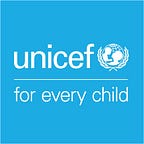21 February 2018
On the frontline of health
Thousands of community health workers bring lifesaving services to mothers and their babies in rural Sierra Leone
Sierra Leone has one of the highest maternal and child mortality rates in the world, but volunteer community health workers like Osman S. Koroma help bring lifesaving health services to their communities. Osman, who cultivates oil palms for a living, is one of 15,000 community health workers in the country who have become critical in improving the health of mothers and babies in rural communities.
“I saw that my people needed help” says Osman, who has been a community health worker since 2011, as he stands in his palm tree plantation in Kathirie Village in Bombali District. “Children under the age of 5 were dying because they were not getting medical attention early when they fell ill.”
Osman (second left) plays with a baby as he sits with his family. As part of his work, Osman identifies sick children and pregnant women in his community to make sure that they access the healthcare they need and is trained to provide them with basic health treatment and advice.
Osman (right) examines Salieu Sesay, 3, using an Acute Respiratory Infection timer, which can help diagnose pneumonia by counting a child’s breaths per minute. UNICEF is equipping the 15,000 community health workers with essential tools and supplies to help them deliver better care.
Osman (left) holds a support group for mothers in Kathirie Village. The women, who attend with their children, meet weekly to discuss maternal health-related topics, including vaccinations and breastfeeding.
Kadiatu Koroma (centre) holds her 9-month-old daughter Isatu Sisay as she listens to Osman after attending the weekly support group for mothers. After establishing that Isatu was acutely malnourished, Osman refers Kadiatu to the nearest health centre.
The following day, Kadiatu walks with Isatu to the Binkolo Community Health Centre, 11 kilometers from the village. Early detection and treatment of malnutrition is crucial to save lives.
Volunteer health worker Sinnah Conteh (right) weighs Kadiatu and Isatu on a set of scales at the health centre. Isatu’s height will also be measured and her results plotted on a graph, this will help determine the extent of her malnutrition and the best course of treatment.
Holding an illustrated flipbook, Sinnah (left) explains to Kadiatu best practices for breastfeeding and how to use the ready-to-use therapeutic food (RUTF) that she is prescribing to treat Isatu’s malnutrition. Isatu is also prescribed medication to treat a skin rash.
Sinnah gives sachets of RUTF to Kadiatu. The sachets contain an energy dense, micronutrient enhanced paste and will ensure rapid weight gain for Isatu.
As she leaves the health centre, Kadiatu smiles, safe in the knowledge that her daughter Isatu is receiving the treatment she needs to bring her back to full health. Community health workers like Osman play an essential role in ensuring that Isatu and children like her lead long and healthy lives.
UNICEF, with UK aid from the British people, is equipping 15,000 community health workers and peer supervisors in Sierra Leone, and training and supervising more than 4,000 community health workers in four districts so that they can deliver better care to women and children.
Read more about community health workers in Liberia.
Learn more about Every Child ALIVE.
